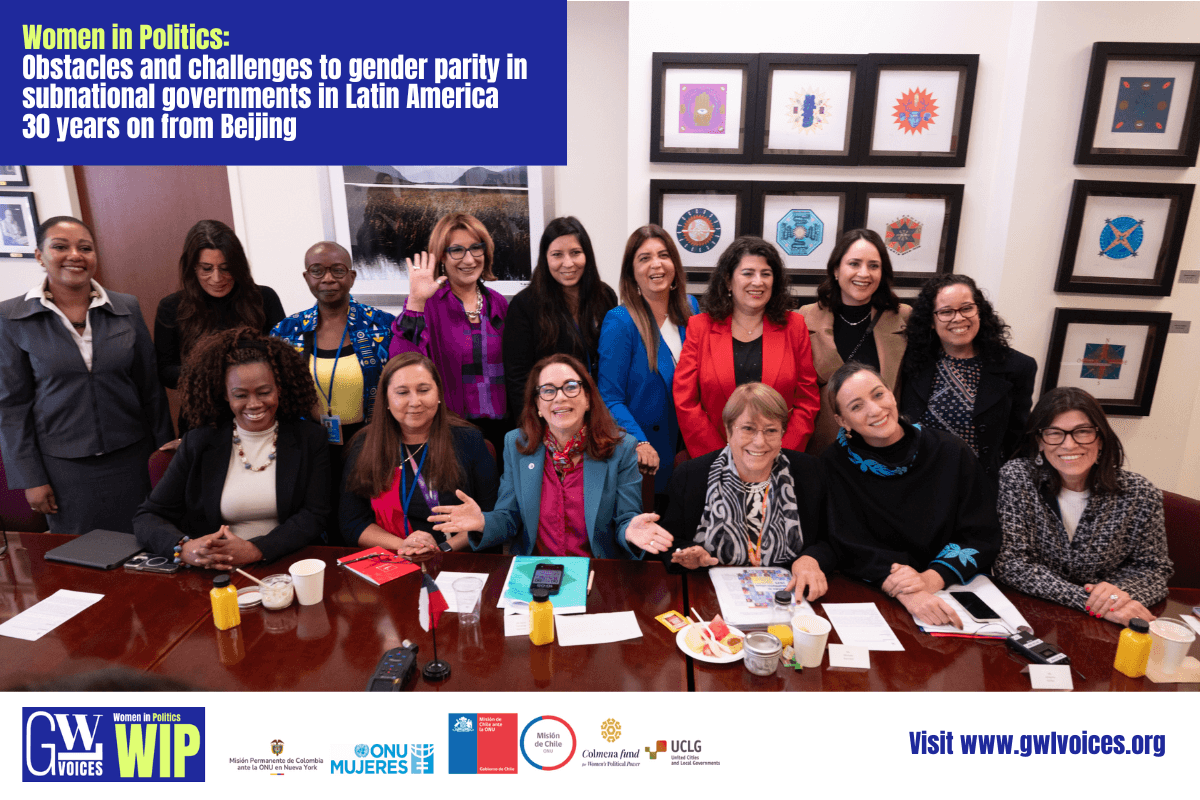Women in Politics at CSW69: Analyzing Gender Parity in Subnational Governments of Latin America

Share
Thirty years after the historic Beijing Declaration and Platform for Action, GWL Voices, in collaboration with UCLG and UN Women, held a high-level event today titled "Women in Politics: Obstacles and Challenges for Gender Parity in Latin America's Subnational Governments."
This gathering brought together prominent political leaders, representatives of international organizations, and governance experts to discuss the persistent underrepresentation of women in local and regional governments. Notable participants included Ambassador Arlene B. Tickner, Itinerant Ambassador for Gender Affairs and Feminist Policy of Colombia; María Fernanda Espinosa, Executive Director of GWL Voices; Johanna Núñez, Prefect of Santo Domingo de los Tsáchilas, Consortium of Autonomous Provincial Governments of Ecuador (CONGOPE); Epsy Campbell, Former Vice President of Costa Rica, Member of GWL Voices and the Steering Committee of the Colmena Fund; Emilia Saiz, Secretary-General of United Cities and Local Governments (UCLG); Ana Elena Badilla, UN Women Representative in Ecuador; and Michelle Bachelet, President of Chile (2006–2010, 2014–2018) and GWL Voices member.
With key political and diplomatic figures in attendance, the event explored how gender-sensitive leadership can transform public policies and generate effective solutions to both local and global challenges. Studies have shown that women in decision-making positions tend to prioritize inclusive policies, family support measures, and gender equality initiatives that have a positive impact on their communities. However, if current trends continue, no region in the world will achieve gender parity in political leadership by 2030.
María Fernanda Espinosa, Executive Director of GWL Voices, emphasized:
"Increasing women's representation is not just a matter of justice; it is a necessary precondition for building more inclusive and sustainable societies. The diversity of perspectives and approaches that women leaders bring is crucial in addressing today's global challenges and enriches every sphere of society. However, despite making up more than 50% of the population, it is still a cause for celebration when a woman reaches an executive position—whether in the private or public sector, from local governance to multilateral institutions. This must change once and for all so that women are no longer the exception but the norm, alongside men."
Emilia Saiz, Secretary-General of UCLG, highlighted:
"Equality begins at the local level in everyday life and can be transformed through the provision of local services. That is why the active participation of women in local decision-making is not only a path toward a better world for all but also a guarantee for driving change in models that have left many people behind. UCLG is committed to fostering women's leadership worldwide."
Ana Elena Badilla, UN Women Representative in Ecuador, stated:
"We have the opportunity to ensure that gender equality is not just a shared dream but a reality. This new generation—what we call Generation Equality—has the transformative power to eradicate injustices, inequality, discrimination, and violence that affect women and girls, keeping us from achieving our goals of equality, development, and peace."
The event provided a unique platform to discuss concrete solutions and innovative strategies to promote the effective participation of women in local politics. Key topics addressed included the lack of global data on women's representation in subnational governments, a factor that hinders the measurement of the impact of intersectional discrimination on women's access to power.